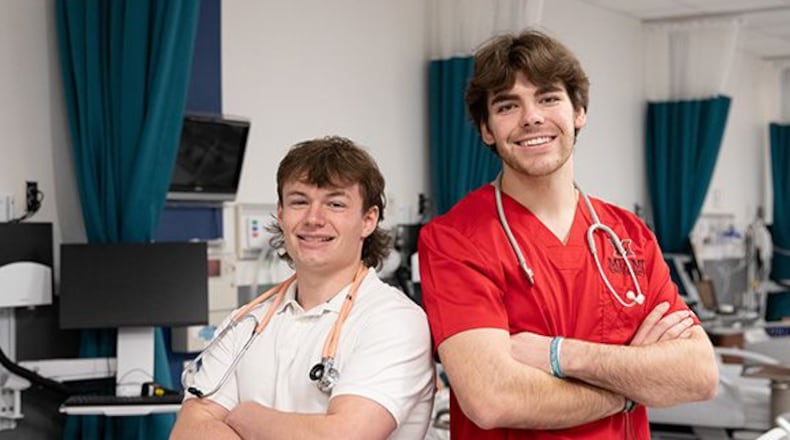It was an apparent heart attack and while other students tried to come to the man’s aid, Reed Stewart and Brayden Osborne were uniquely prepared to save his life.
Together they quickly applied CPR to the fallen teacher and school – and Hamilton EMS officials – both said the students’ speedy actions saved him from sudden death, according to a a just-released account from Miami officials.
Stewart said the teacher “emailed me several weeks later thanking me for what I had done and said because of me, his family was able to have Christmas with him this year.”
Stewart, a Miami junior and resident of Loveland in Hamilton County who majors in nursing with a minor in nutrition, said: “After I read that in the email, it hit me what I had done.”
The medical emergency happened as the instructor and some of his students were about to enter Mosler Hall for a finals week exam, said school officials.
After the man collapsed, Osborne – who is a sophomore and lives in Brookville, Ind. – told Miami officials he felt compelled to help as he watched Stewart perform CPR, so he offered assistance by also performing CPR chest compressions before paramedics arrived.
“It was a very scary thing that day, seeing my professor so blue in the face relying on his students to save his life,” said Osborne, who credited his pre-nursing courses with giving him confidence to assist in the lifesaving.
“The courses I have taken at Miami so far, I would say, have definitely shaped me into who I was that day — with the knowledge I had,” Osborne said. “It gave me the courage and the strength to step in that day.”
The adjunct professor - whom Miami officials said has asked to remain anonymous and declined to comment - is still recuperating from the incident, school officials told the Journal-News.
Tony Harris, president of Hamilton Professional Firefighters Local 20, said the students’ life-saving actions made a difference by “delivering what appeared to be very effective CPR” before the four-person emergency medical personnel crew arrived on campus.
“I truly believe the good and quick CPR helped us to have a chance for a good outcome,” Harris told school officials.
Stephanie Nicely, Miami chair and associate professor of nursing, said: “Reed and Brayden’s heroic actions and willingness to provide immediate care epitomize the very essence of nursing.”
“This incident underscores the vital role that nurses play in the lives of patients and families, not only in healthcare settings but in everyday life,” said Nicely.
“Their swift intervention is a testament to their training, courage, and commitment to the nursing profession.”
According to an account of the incident just released by Miami, Connie Webb, who is Stewart’s supervisor in his part-time job in the campus mailroom in the Mosler building, said she is glad the students were there to help.
Webb was on hold on the phone when she noticed another student quickly approach the automated external defibrillator (AED) designed to save victims suffering heart attacks and remove the machine from the wall and rush out.
She wasn’t sure what was going on, so she asked Stewart to call security.
As he was reaching for the phone to make the call, another employee came around the corner and said there was a man down on the ground outside.
“Reed (Stewart) immediately popped up out of his chair and said he could help,” recalled Webb, who then phoned security and her supervisor to alert them of the situation.
Stewart said he went outside and found several students standing over the teacher. They were screaming for help and asking if anyone knew CPR. Stewart ran over and quickly assessed the situation: He wasn’t breathing and had no pulse.
“I knew every second his brain wasn’t getting oxygen, it would decrease his chances of survival,” said Stewart, who had asked another student to call 911 before repositioning the man on his back so he could start CPR.
Osborne also assisted with chest compressions, then Stewart switched back to doing them.
“This all happened so fast and my heart was pounding out of my chest,” Stewart said. “After several minutes of CPR, eventually I heard extremely shallow and strained breathing” from the man, “so I knew I was buying him valuable time while EMS was on its way.”
Later Osborne said the rescue “was the biggest lesson to me in this event, as I see what nurses and paramedics go through as they deal with so many patients in distress.”
“While it was very stressful,” said Osborne, “this will always be a special moment in my heart as I feel I made an impact on his life that day.”
Looking back, Stewart said his feelings were indescribable yet fulfilling.
“It puts a smile on my face to this day whenever I think about it.”
About the Author
